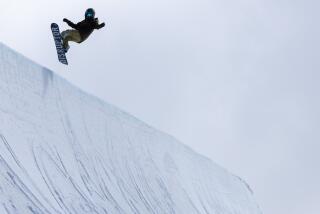Tips to Skiers for Skin Protection
- Share via
Your skis are waxed and ready to go. Your ski outfit and goggles are marvels of modern technology. You know about eating pasta for energy, drinking water to counteract the cold, handling minor injuries and how to avoid fatigue and altitude problems.
But what about your skin?
Although skin care may seem to be a trivial matter, neglecting your skin may cause annoying rashes, itching and many other discomforts.
Skiing can be tough on your skin. Cold. Wind. Sun. Low humidity. Sweating under many layers of clothing. Saunas and whirlpool baths after skiing.
The Sherpas, who live high in the Himalayas, use yak butter to protect their skin from the elements.
Here are some tips:
The adage not to take a bath just before going out in the cold is correct, but for the wrong reason. Cold weather does not cause colds. The cold and dry air pull moisture out of your skin, leaving skin rough and uncomfortable. Bathing aggravates this by removing natural protective oils that form a barrier between your skin and the environment.
Take baths, or even better, take showers, in the evening. Showers remove less of the protective oils. The best: short, lukewarm showers. Then merely pat yourself dry. Afterward apply a moisturizer to your entire body.
Ideally, leave a little water on your skin and apply the moisturizer over that water. You lock in moisture, so to speak. This lubricates and softens skin.
Moisturizers frequently recommended by dermatologists are Moisturel, Alpha-Keri and Lubriderm.
Oily Soaps Recommended
Use oilated soaps such as Dove, Oilatum or Purpose. Most of the everyday brands of soap are rough and drying, and also remove the protective oils. When traveling, do not rely on soaps supplied by hotels. Carry your own.
Apply a moisturizer in the morning, too. For very cold weather, creams are more soothing than lotions. Apply the cream at least 30 minutes before going out and rub it firmly into your skin.
Avoid wearing snug clothing. Constant pressure on the skin tends to cause chafing. Tight, rough, woolen fabrics are the worst offenders. Extremely tight-fitting garments may interfere with blood circulation and cause sores.
Keep Cool
Keep cool in the cold. Modern winter clothing is so effective in keeping you warm that perspiration is often a problem. Excessive perspiration causes rashes and itching.
If you feel uncomfortably warm, remove a layer or two of clothing. One of the most effective ways to let heat out is to remove head coverings and loosen clothing around the neck. Body heat escapes upward.
Saunas and hot baths, popular post-ski activities, can cause problems. In saunas the humidity is often less than 10%. This dries out your skin. Use a moisturizer after the sauna.
Hot tubs are difficult to keep clean. When not properly maintained the tubs contain bacteria that cause infections, especially to skin that’s cracked and chafed from the cold.
Bathe only in tubs that appear clean, keep your head out of the water to reduce chances of ear and eye infections, avoid swallowing water and wash yourself with soap and water after using a hot tub. Also, for the sake of others, never use a hot tub if you have a skin infection.
Heat Dries Air
Increase the humidity in your room overnight. Excessive indoor heating dries the air. This in turn removes moisture from your skin. Lower the thermostat, place pans of water on or near radiators and, when necessary, use a vaporizer or humidifier.
Relieve already parched, dry or scaly skin by frequently using emollients--Carmol, Balmex, Lubriderm. These soften and lubricate, and help the skin repair the damaged outer cells.
Protect your lips with a medicated lip balm--Chapstick Sunblock 15, Sundown Sunblock 20--to avoid cracking from sunburn, windburn and from cold, dry air.
Lip balms are available that soften, soothe and protect chapped lips--Presun 15 Facial Stick Protector and Blistex Medicated Lip Ointment, for example.
Adequate sunglasses help to protect sensitive skin on eyelids.
